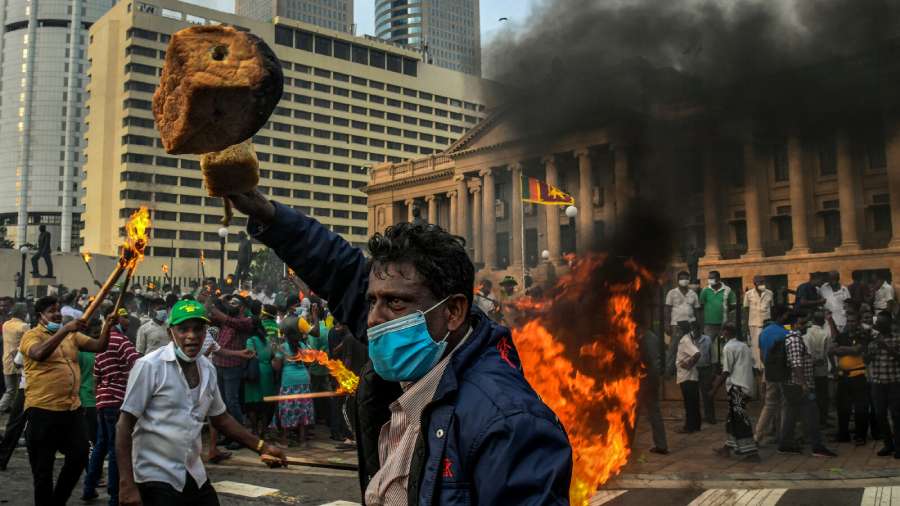Sri Lanka's usable foreign reserves dropped down to less than USD 50 million, finance minister Ali Sabry informed Parliament on Wednesday as it convened for a crucial session after the main Opposition party submitted no-confidence motions against President Gotabaya Rajapaksa and his government for mishandling the country's worst economic crisis.
The main opposition party, Samagi Jana Balawegaya (SJB), handed over to Speaker Mahinda Yapa Abeywardena two motions of no-confidence against the SLPP coalition government and embattled President Gotabaya Rajapaksa under Article 42 of the Constitution.
Article 42 stipulates that the President is responsible to Parliament for the exercise, performance and discharge of his functions.
Any motion needs seven days' notice before getting into the order paper for debate. A date has not yet been announced for a vote on the no-confidence motions.
Detailing the perilous state of the economy, Sabry, who has just returned from Washington after crucial talks with the officials of the International Monetary Fund (IMF), said Sri Lanka's usable foreign reserves which were at around USD 7 billion in 2019, had dropped to less than USD 50 million now.
"We have bitten off more than what we can chew," Sabry acknowledged before Parliament while reminding warring political parties that they have a national responsibility to contribute to revive the island nation's collapsed economy.
Sabry hailed India's assistance during its talks with the IMF to seek a bailout to evade the country's worst economic crisis.
He said he met India's Finance Minister Nirmala Sitharaman twice and she extended India's fullest assistance for a rapid financing instrument (RFI) facility for Sri Lanka.
Sri Lanka reached out to the IMF for a possible bailout after suffering its worst economic crisis since independence.
Sabry said an IMF programme would be important to undertake much needed reforms, adding that the government had committed a historical mistake in not opting for an IMF programme much earlier.
We as a country are living behind our means, all governments have spent more than they earned," he said.
Sabry said Sri Lanka needs USD 3-4 billion, bridging finance until the IMF facility could kick in. The IMF is not Aladdin's magic lamp," he warned.
Sabry, who originally resigned from the finance ministry before being reappointed, said a united effort was needed to pull the country out of the crisis.
Sri Lanka is on the brink of bankruptcy and has suspended payments on its foreign loans. Its economic miseries have brought on a political crisis, with the government facing protests and no-confidence motions in Parliament.
The Opposition parties accuse top government officials of excessively printing money, hurting farm production by banning chemical fertilizers to make the production fully organic and minimize import costs, failing to order COVID-19 vaccines in a timely manner and buying them later at higher prices.
On Wednesday, Sri Lankan police arrested 12 people for staging an anti-government protest near the Parliament building here.
The protesters holding placards and shouting slogans against the lawmakers were put into a bus and taken to a nearby police station by the policemen on duty as they approached the parliament building.
Main opposition leader Sajith Premadasa told parliament that the protesters had arrived at the parliament gate to hand over a letter to the Speaker of parliament.
Police minister Prasanna Ranatunga said the protesters had hooted at the parliamentarians and that was a breach of parliamentary privilege.
The arrest followed the arrival of several thousands of student activists who poured onto the road leading to parliament where the riot police stood by.
The main Tamil party along with the former prime minister Ranil Wickremesinghe's United National Party (UNP) are to jointly move a no-trust motion against President Gotabaya Rajapaksa, which would imply that the House had lost confidence in the President.
The TNA/UNP motion has no legal binding for the President to resign. This problem can only be solved if either the President or the Prime Minister resigned. It is up to them to make a decision," Wickremesinghe said.
Under Article 38 of the Constitution, a president can be removed only if he/she volunteered to resign or through the long process of impeachment.
Experts said if the government would be defeated in the SJB motion, Prime Minister Mahinda Rajapaksa and the Cabinet would have to resign.
Thousands of demonstrators have hit the streets across Sri Lanka since April 9, as the government ran out of money for vital imports; prices of essential commodities have skyrocketed and there are acute shortages in fuel, medicines and electricity supply.
Protestors are demanding the resignations of Prime Minister Mahinda Rajapaksa, who heads the powerful family that has held power for most of the past two decades, and his younger brother President Gotabaya Rajapaksa.
So far, the Rajapaksa brothers have resisted calls to resign, though three other Rajapaksas out of the five who are lawmakers stepped down from their Cabinet posts in mid-April.
Sri Lanka's Parliament is to meet on Thursday to elect a Deputy Speaker as President Gotabaya Rajapaksa had accepted the resignation of the incumbent Ranjith Siyambalapitiya, Speaker Mahinda Yapa Abeyawardene announced.
 Monday, 23 December 2024
Monday, 23 December 2024









